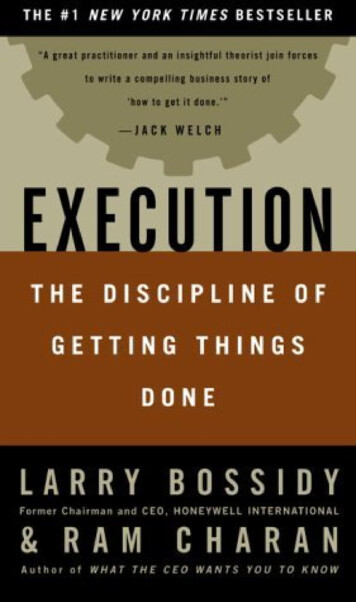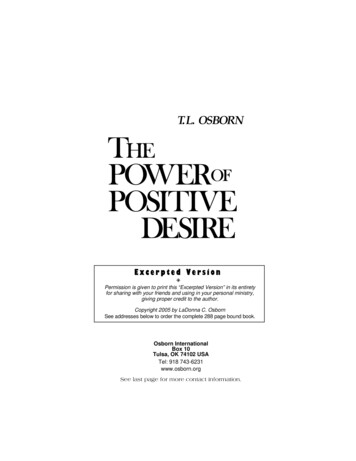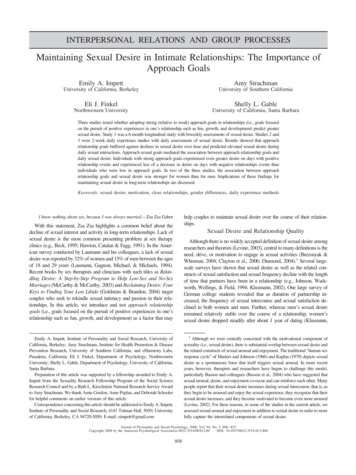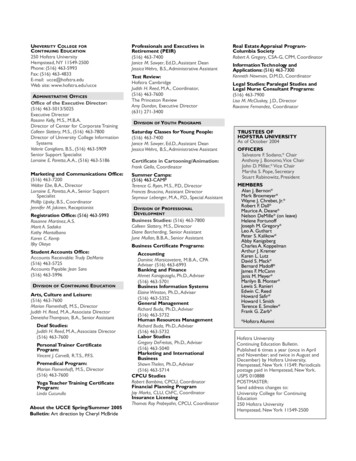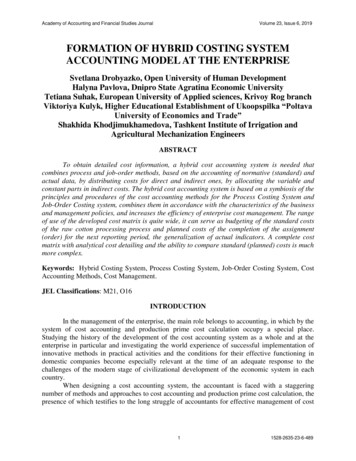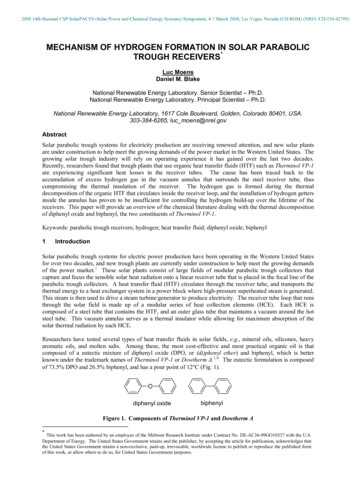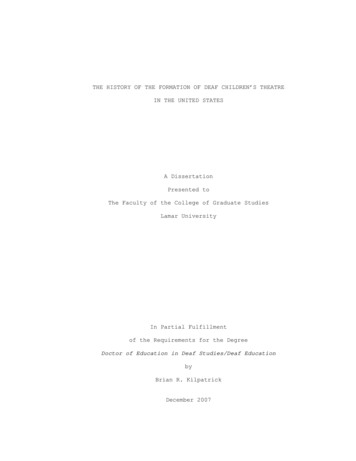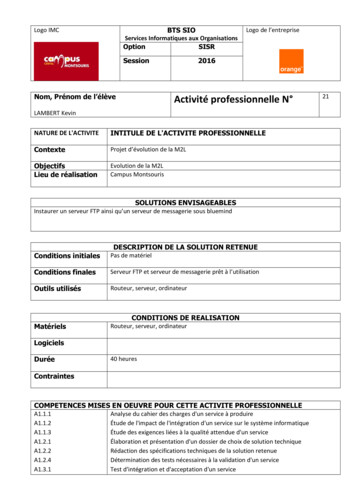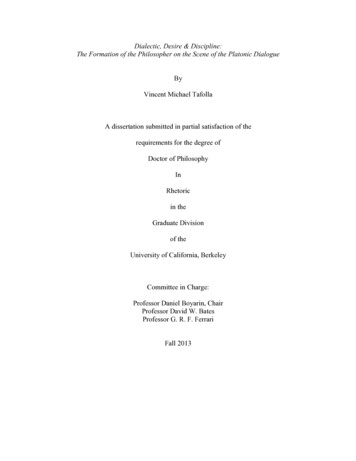
Transcription
Dialectic, Desire & Discipline:The Formation of the Philosopher on the Scene of the Platonic DialogueByVincent Michael TafollaA dissertation submitted in partial satisfaction of therequirements for the degree ofDoctor of PhilosophyInRhetoricin theGraduate Divisionof theUniversity of California, BerkeleyCommittee in Charge:Professor Daniel Boyarin, ChairProfessor David W. BatesProfessor G. R. F. FerrariFall 2013
1AbstractDialectic, Desire & Discipline: The Formation of the Philosopher on the Scene of the PlatonicDialogueByVincent Michael TafollaDoctor of Philosophy in RhetoricUniversity of California, BerkeleyProfessor Daniel Boyarin, ChairThe following argument explores the relationship between epistemology and ethics in thePlatonic dialogues. Focusing on the drama that takes place on the scene of the dialogues, I traceSocrates’ struggle to impose rules on the conversation. What I show is that though Socrates’question invites a response from his interlocutor (and so, is commonly celebrated as openended), the questions he asks and the rules he imposes, restricts contribution that his interlocutorcan make to the dialogue. I argue that this discursive practice, the dialectic, not only imports aspecific epistemology—a specific image of knowledge—but this episteme is used to interpretwhat Socrates’ interlocutor values and desires; so the discourse brings with it a certainunderstanding of the form that desire should take. The epistemological assumptions, then, alsoassume (and endeavor to produce) a particular type of subject. A careful examination of thediscursive practice by which Plato distinguishes Socrates and philosophy from other figures andpractices reveals that Plato’s epistemological and ethical ends are more circumscribed than isusually acknowledged. By developing a sensitivity to the struggle that takes place over method,I argue, one not only becomes sensitive to the exclusions on which philosophy is founded (e.g.,the considerations deemed irrelevant to the conversation) but one also develops a sensitivity tothe power dynamic that structures the relationship between interlocutors. More broadly, thisraises the problem of how certain discursive practices support particular distributions of powerand different ethical possibilities while suppressing others.
iFor my parents, whose work is behind everything I do&For Mary Jo, for your love, your support, your patience,and your criticism.
iiTable of Contents:Introduction: On Socratic Cruelty & the Production of the Philosophical Subject .iiiAcknowledgments .xxivChapter One: “Bound & Gagged,” On the Nature of the Dialectic 1Chapter Two: The Threatening Intimacy of Speech .36Chapter Three: Plato’s Erotics – Purifying Discourses, Purifying Desires .66Chapter Four: The Mythic Topos: Situating the Soul in a World of Relations .89Chapter Five: The Subject of Philosophical Eroticism .113Bibliography 148
iiiIntroduction: On Socratic Cruelty & the Production of the Philosophical Subject:Callicles:“How violent (biaios) you are Socrates . Couldn’t you go through the argumentby yourself, either speaking by yourself or answering yourself?Socrates:“Epicharmus’s saying may come to pass for me: ‘What two men were sayingbeforehand, I, being one,’ may become sufficient for” (Gorgias 505d-e)The Confession of a Reluctant Plato Scholar:What drives my interest in Plato’s work is what, for the longest time, drove me awayfrom it. Platonic/Socratic Cruelty. Since first encountering the Platonic dialogues I have beenunable to shake the feeling that Socrates, the philosophical hero par excellence, frequentlybehaved in very questionable ways towards his interlocutors. Though I was interested in manyof the questions they raised, for a long time I avoided the Platonic dialogues because I wasdisturbed by the aggression of this character, Socrates, who, together with Plato, has been solong enshrined as the origin of Western philosophy. Indeed, what made this suspicion of Plato’sSocrates all the more disturbing was the sense that there was an almost universal code of silencethat surrounded the issue. There is something very lonesome in suspecting Socrates in thismanner; for when Socrates verbally abused his interlocutors, when he cut them off before theycould explain themselves, when he made fun of them, when he shamed them, when he appearedto distort what they were saying, it seemed that no one noticed. No one objected. No oneprotested. No one, that is, except for the Plato’s characters themselves.Despite the relatively scant attention that Platonic/Socratic cruelty receives amongstPlato’s readers, the dialogues themselves frequently register the discomfort and objections ofSocrates’ interlocutors. Thus, in the epigraph above, we find Callicles protesting the “violence”of Socratic questioning as he resists Socrates’ pressure to persist in their discussion. Moreover,Socrates does not deny this charge, but instead admonishes Callicles for refusing to “put up withbeing improved and experiencing the very treatment now under discussion, the process ofdiscipline” (Gorgias 505c). Indeed, earlier in the same dialogue, when Polus hesitates tocontinue answering Socrates’ questions, Socrates acknowledges the discomfort he causes. “Donot hesitate to answer Polus,” Socrates says, “for it will do you no hurt, but submit nobly to theargument as you would to a doctor, and say either yes or no to my question” (Gorgias 475d). Itis worth noting in this context that the medical treatments that the dialogue mentions are ratherviolent—they include surgery, cautery and the use of purgatives (456b, 480c)—so whether heportrays himself as a doctor or a disciplinarian, Socrates seems to acknowledge that his practiceis marked by a certain violence. Needless to say, by portraying himself as a doctor, Plato’sSocrates seeks to justify this violence in the name of his interlocutor’s psychic health.I will discuss the Gorgias at length in chapter one, but it is important to notice that thisportrayal of the dialectic as a violent, if well-intentioned, undertaking is not limited to that text.In the Meno, Socrates is famously compared to a torpedo fish, because contact with him“numbs” his interlocutor’s lips and mind, reducing him to helplessness (80a-d). In the Laches,Nicias warns Lysimachus that, should he enter into conversation with Socrates, he wouldundoubtedly become “entangled” in the argument and that “Socrates will not let him go until hehas completely and thoroughly sifted him” (187e-188a). Nicias describes this as a worthyexperience, of course, but that should not blind us to the unmistakable intimations ofviolence/compulsion in the Socratic “trapping” that he describes. The portrayal of Socrates assetting traps is notable in that it invokes the activity of hunting, to which philosophy is frequently
ivcompared. The philosopher is not only represented as a “mighty hunter” and “master of deviceand artifice” in his pursuit of abstract beauty and truth (Symp 203d), but the dialogues’discussions of philosophical eroticism also portray him as a hunter of beautiful boys (Phdr 253c,Prot 309a), which suggests that the philosopher’s aggressive attitude is not lost in hiscomportment towards those around him.1 Indeed, in the Gorgias, Callicles not only complainsabout this sort of behavior (this aggression and trap setting), but Socrates seems to acknowledgethat he does this sort of thing. 2So, why, despite the protests that Plato preserves in the margins of his texts, is there notmore attention paid to this question of Socrates’ dialectical behavior? Part of the reason, nodoubt, stems from the nature of the Platonic dialogues themselves. Socrates is their unrivalledhero. In the Gorgias, he is presented as the only living Athenian to practice “the true art ofpolitics” (521d). In the Symposium, Socrates communicates from the prophetess Diotima a newset of mysteries, which are both a new erotic practice and a new politics. Moreover, Socrates’resemblance to Eros as conceived by Diotima, clearly indicates that he embodies this new way ofliving. Moreover, Socrates ultimately sacrifices himself to this new way of living, becoming itsmartyr and thus teaching the Athenians a new way of dying. And in the Phaedrus Socratesbecomes an image of Zeus. It is no easy thing to question a character of such stature, so even asPlato preserves the concerns of Socrates’ critics, his portrayal of Socrates makes it difficult totake their protests too seriously. Indeed, Plato inoculates Socrates against such protests all themore effectively by putting them in the mouths of questionable characters.If this is Plato’s strategy, it has largely worked. While Plato blunts the force of criticismsaimed at Socrates by incorporating such weakened protests into his dialogues, many of Plato’sreaders simply obliterate them. David M. Halperin exemplifies this approach. The picture ofSocratic dialogue that Halperin provides is in many respects quite traditional. “The Platonicdialogue is the true model of philosophical inquiry,” Halperin says:(Plato) was perhaps the only one who fully understood the reciprocal eroticdynamic of a Socratic conversation and he employed the dialogue-form toillustrate its workings. For in Plato’s hands the dialogue-form itself represents anattempt to recapture the original and authentic context of philosophy—theexchange of questions and answers from which emerges, dialectically, an imageof excellence: the lover’s beautiful speeches. By its very form, then, the Platonicdialogue aspires to engage the reader in a give-and-take, a mutual exchange ofideas, an open-ended discussion. (78-79)31In this the philosopher closely resembles the sophist, as he is conceived of in the Sophist, as a hunter of rich, youngmen (221c-223b). The difference, the Sophist suggests, is the quality of their “prey.”2When Callicles protests Socrates’ shame tactics, he says that Socrates caught Polus and Gorgias “in the toils of(his) argument and silenced (them),” shaming them into contradictory positions (482d-e). Socrates denies theaccusation, but in a manner that casts doubt upon his denial. As he asks Callicles a question that will lead him intocontradiction as well, Socrates insists, “I am not trapping you with words” (490a); but he immediately interruptsCallicles’ answer, “Hold there a moment!” (490a-b), indicating that he is indeed trapping Callicles with words.3Halperin, David M. “Plato & Erotic Reciprocity.” Classical Antiquity. 5.1 (1986): 60-80. For similar treatmentsof the Platonic dialogues, see also: Friedlander, Paul. Plato, v. 1. Trans. Hans Meyerhoff. New York: PantheonBooks, 1958. 165-66; Sinaiko, Herman L. Love, Knowledge, & Discourse in Plato. Chicago: U of Chicago P,1965. 15-16.
vHalperin’s picture of philosophical dialogue relies, on the one hand, on his provocative readingof philosophical desire, which suggests that contrary to the Athenian convention Plato eliminatespassivity from the pederastic relationship. On the other hand, it relies heavily on Plato’s SeventhLetter, which describes philosophical insight as “flash(ing) out” when, over the course of a longtime, a subject is “closely examined in an atmosphere of good will and an ungrudgingexchange of questions and answers” (344b-c, qtd. in Halperin 78). It is worth pointing out,however, that Halperin does not examine Socrates’ actual dialectical behavior as it appears in thedialogues to see whether it fits his description. I will return to Halperin in chapter five below,but what is important to recognize now is that Halperin’s conclusions are also reached by manyother paths. Gregory Vlastos’ studies of the Platonic dialogues, for instance, focus largely on thelogical structure of the arguments that unfold during Socratic elenchus (or cross examination).However, he too describes Socratic questioning as “a cooperative endeavor for mutualenlightenment.”4 On the other hand, Julia Kristeva, whose poststructuralist approach to thedialogues could not be more different from Vlastos’, also stakes out a similar position withrespect to Socrates’ dialectical behavior. “Socratic dialogues are characterized by opposition toany official monologism claiming to possess a ready-made truth. Socratic truth (“meaning”) isthe product of a dialogical relationship among speakers; it is correlational and its relativismappears by virtue of the observers’ autonomous points of view.”5 These scholars (and manyothers) infer from the fact that the Socratic interrogation takes dialogue-form that Socrates’approach to his interlocutors allows for a “cooperative” and “open-ended” endeavor. That is tosay, they assume that Socrates is open to a meaningful dialogue, in which his interlocutor isgiven the opportunity to independently make the strongest case for a given position as he is able.The dialogue-form then, in itself, would seem to embody Socrates’ “relentless polemic againstdogmatism” (Vlastos 1994 45). It is easy to understand how one infers open-endedness fromdialogue-form. After all, Socrates does not deliver monologues (not officially, anyway). Heinvites his interlocutor to speak, so how could one detect dogmatism or eristic or violence inthat?It is worth sounding a note of warning here. In Socrates and the Fat Rabbis, DanielBoyarin forcefully argues such questioning can indeed act dogmatically. Drawing on the workof Mikhail Bakhtin, Boyarin reminds us that there is a difference between “representeddialogues” or pieces of text that are formally dialogues and those texts that are moremeaningfully “dialogical.” Dialogical texts are those in which discourses that are alien to theauthor’s own are allowed to enter into and disrupt the author’s discourse and the vision of the4Vlastos, Gregory. “The Socratic Elenchus.” Socratic Studies. Ed. Miles Burnyeat. Cambridge: Cambridge UP,1994. 35. Vlastos also treats the question of philosophical eroticism, but he does so in isolation from the question ofphilosophical dialogue. “The Individual as Object of Love in Plato,” Platonic Studies, 2nd ed. Princeton, NJ:Princeton UP, 1981. 3-42.5Kristeva, Julia. “Word, Dialogue, Novel.” Desire in Language: A Semiotic Approach to Literature and Art.” Ed.Leon S. Roudiez. Trans. Gora, Thomas, Alice Jardin and Leon S. Roudiez. New York: Columbia UP, 1980. 81,my emphasis. Kristeva’s position in this article focuses more on the work of Mikhail Bakhtin than on the work ofPlato. It is worth noting, however, that to the extent that she describes “the observers’ autonomous points of view”(the reader’s position) as relativizing the outcome of Socratic dialogue, Kristeva seems to make the truth of theSocratic dialogue relative in spite of itself. By emphasizing the manner in which the reader, as audience of thedialogue, reopens the question under discussion, Kristeva actually finds in the transmission of the dialogue aresource—the audience—whose judgment of the issue Socrates frequently dismisses. In any case, Kristeva’sdescription of the “relative” status of the truth of Socratic dialogue does not conform to Socrates’ frequentpronouncements about the epistemic certainty of his conclusions. For instance, that “these facts are buckled fastand clamped together—to put it somewhat crudely—by arguments of steel and adamant” (Gorgias 508e-509a).
viworld that it implies. Dialogism or dialogue in this sense is more far reaching phenomenon thanthe dialogue-form. Bakhtin explains:The essential dialogicality of (a text) is in no way exhausted by the external,compositionality expressed by dialogues carried on by characters . This is sobecause dialogic relationships are a much broader phenomenon than mererejoinders in a dialogue, laid out compositionally in a text; they are an almostuniversal phenomenon, permeating all human speech, and all relationships andmanifestations of human life—in general, everything that has meaning andsignificance.6Dialogue, then, not only takes place in the back and forth exchanges between characters, it ispermeates any socially coded behavior. (For instance, when one “acts like a man,” one’sbehavior is a response to inherited practices and discourses about what constitutes masculinity).So as readers of literary texts, according to Bakhtin, we can discern dialogues betweencompeting discourses throughout all of the text’s structures, not just in the represented dialogue.Indeed, Boyarin points out that formal dialogues frequently offer the most impoverished form ofdialogism. “This is owing. to the fact that in represented dialogue, the dialogue is an object,”and as such, “alien languages are not allowed to enter the language of the author which remains(at least at these moments) monologically in control of the objects of representation” (15).Of course, this discussion focuses on literary works in which one can refer to an authorthat is distinct from his characters. And the question that I have raised concerns whetherSocrates’ questioning fosters a meaningful dialogue between characters, so I have not sought tomake this move back and forth between character and author as Bakhtin and Boyarin do.Nonetheless, this idea of turning another’s discourse into an object to be investigated and held ata distance describes an important effect of Socrates’ questions; so it is legitimate to ask whetherSocrates’ questions do not actually work to dampen the dialogue.However, there is remains little room in the traditional (and still dominant) picture ofSocrates’ philosophical practice for Callicles’ or Protagoras’ or Polus’ objections to Socrates’behavior. In the literature on Plato’s dialogues, with a few exceptions these characters’complaints barely receive any hearing. The works of Halperin, Kristeva and Vlastos are typicalin this regard. While the first two scholars’ celebrations of philosophical dialogue ignore anyindication of domination in the Platonic texts altogether, Vlastos’ classic essay, “the SocraticElenchus,” only fleetingly acknowledges the discomfort of Socrates’ interlocutors. Disputinganother scholar’s account of how the dialectic’s conclusion is drawn, Vlastos insists thatSocrates’ interlocutor does not draw the thesis that contradicts his original thesis by himself.Rather, Vlastos writes, “It is Socrates who draws it; the opponent has to be carried to it kickingand screaming” (29, my emphasis). Vlastos, of course, does not dwell on any scene in whichSocrates overcomes the resistance of his interlocutor nor does he register any of the specificcomplaints that Socrates’ interlocutors make. More importantly, this image of Socratesoverpowering his interlocutors does not bother Vlastos’ depiction of Socratic elenchus as “acooperative endeavor for mutual enlightenment.” Why should it? Vlastos dismisses suchprotests out of hand by figuring them as the childish tantrums of those who, in spite of6Bakhtin, Mikhail M. Problems in Dostoevsky’s Poetics. Ed. And trans Caryl Emerson, Minneapolis: U ofMinnesota P, 1984. 40. Quoted in Boyarin, Daniel. Socrates & the Fat Rabbis. Manuscript, 2007. 15.
viithemselves, must be forced to face reality. Surely, Vlastos implies, one need not take suchtantrums seriously.7Interrogating Socrates: What is Philosophy?There is one strain of contemporary Plato scholarship that tends to confront Socrates’questionable dialectical behavior more squarely than most. This group of scholars is diverse intraining and approach, but they are united in posing the question, “What, for Plato, isphilosophy?” and in answering it in terms of a distinctive method, the dialectic. This is not theonly answer to the question of what philosophy is that Plato’s dialogues will support. As we willsee below, another approach to the dialogues answers the question in terms of the philosopher’sintention and character. Instead of asking “what is philosophy,” the second group of scholarsasks, “Who is the philosopher?” It is not surprising that both approaches have been fruitful, fordialogue after dialogue poses the questions of who and what Socrates’ interlocutor is/does, andthese questions are consistently attended by the more or less explicit questions of who Socrates isand what he does.8 In what follows, I will argue that method (the dialectic) is central to Plato’sunderstanding of philosophy. However, the “intentional” approach offers a valuable supplementto the “methodological” approach. This is particularly true to the extent that methodologicalreadings sometimes focus too narrowly on logical concerns and lose sight of the larger context inwhich the dialectic is conducted. That said, methodological readings of Plato are of particularinterest, because to the extent that they ask how the dialectic is conducted, they prompt one toconsider how Socrates treats his interlocutors. The task of characterizing the dialectic puts onein a better position to seriously consider the protests of Socrates’ interlocutors: Do the Platonicdialogues bear witness to a certain violence or coercion in the performances of the dialectic?Methodological Readings. A classic statement of the case for distinguishing Plato’sphilosophy by method is articulated by G.B. Kerferd. While recognizing that a precise definitionof the philosopher’s method remains elusive, Kerferd insists on the centrality of the dialectic toPlato’s understanding of philosophy. “It has been well said that the word ‘dialectic’ had a strongtendency in Plato to mean ‘the ideal method, whatever that may be’,” he writes, “But it regularlyinvolves an approach to the Platonic Forms and this more than anything else distinguishes it7When he waives away the protests of Socrates’ interlocutors, Vlastos reproduces Plato’s gesture of disparagingSocrates’ interlocutors rather than addressing their concerns. This is reminiscent of the Gorgias’ “jury of children,”in front of whom Socrates imagines his trial:My trial will be like that of a doctor prosecuted by a cook before a jury of children . If theplaintiff should accuse him in these terms: Children of the jury, this fellow has done all of youabundant harm ruining you by surgery and cautery, and he bewilders you by starving andchoking you, giving you bitter draughts and compelling you to hunger and thirst, whereas I used tofeast you with plenty of sweetmeats of every kind.What do you think a doctor could find to say in such a desperate situation? If he spoke the truthand said, “All this I did, children, in the interests of health,” what a shout do you think such a jurywould utter? (Gorg 521e-522a)Who wants to side with the children (the Athenians) who condemned Socrates to death or the cook (the orators) whoprosecuted him? Obviously, I do not defend Socrates’ death sentence, but one can question how he treats hisinterlocutor without being reduced to that position.8Just to give a sense of how widespread this concern is in the dialogues: The question, of who Gorgias is frames thebeginning of the discussion in the dialogue named for him (447c); the same question is put to Protagoras afterHippocrates proves unable to answer the question about who/what Protagoras is (Prot 316c, 311b-312a); a versionof this question also opens the Phaedrus (227a); and when the Sophist poses this question about the sophist, ofcourse, the philosopher is very clearly implicated in the investigation (230b-c).
viiifrom antilogic.”9 Opposing dialectic to the Sophistic practice of developing antilogies orcompeting arguments about a given phenomenon (neither of which is treated as the final word),Kerferd argues that for Plato the dialectic is distinguished by its epistemological horizon.10 Thatis to say, while sophistic antilogies highlight the contradictory and changing meaning of sensualphenomena, the dialectic “look(s) elsewhere for the truth to more permanent, secure andreliable entities, the famous Platonic Forms” (Kerferd 67). Because its object, the form/Being, isoutside of that ever-changing world of becoming, dialectic is thought to reach—or, at least, reachfor—a more stable form of knowledge. Kerferd is skeptical about the manner in which Platodistinguishes the philosopher’s method from that of the sophists. In particular, he argues that“when Plato suggests, as he does repeatedly, that the sophists were not concerned with thetruth, we may begin to suppose that this was because they were not concerned with what heregarded as the truth, rather than because they were not concerned with the truth as they saw it”(Kerferd 67). Thus, he suggests, Plato’s dialogues transform a serious, epistemologicaldisagreement into an occasion to attack Socrates’ interlocutors for their “moral failings.” In hiscritique of the dialectic, Kerferd echoes the position of Richard Robinson, who details theepistemological assumptions that are imported with Socrates’ “What is x”-question (58-60),criticizes Plato’s failure to seriously justify his methodological imposition (82), and describesSocrates’ question-asking as constraining the speech of his interlocutor (7-9). This position hasrecently been echoed Daniel Boyarin, who argues that Socrates consistently and dogmaticallyfoists the dialectic upon interlocutors in order to assert control over the conversation.11Such critiques of Plato’s method, however, are relatively rare. It is far more common forPlato scholars to share Kerferd, Robinson and Boyarin’s basic contention that the dialectic isportrayed as the philosophical method without sharing their reservations about the manner inwhich it is conducted. There is a distinct tendency towards adulation that animates a lot of Platoscholarship, and this frequently involves an almost ritual abuse of Socrates’ interlocutors.12 Such9Kerferd, G.B. The Sophistic Movement. New York: Cambridge UP, 1981. 65. On the slipperiness of the term“dialectic,” Kerferd quotes Robinson, Richard. Plato’s Earlier Dialectic. Oxford: Clarendon Press, 1953. 70.10“At any one time the same man, for example, is both short and tall, depending on whom he is compared with”(Kerferd 66). Thus, according to Kerfed, antilogic reflects the conflicting and relative character of the phenomenalworld, which Plato takes as indicating the need for a more stable epistemological ground.11Boyarin 2007 139.12We have already seen this in Vlastos’ portrayal of Socrates’ resistant interlocutors as children. It can also be seenin the frequent condemnation of the dialectical ineptitude of Socrates’ interlocutors. Henry Sidgwick, for instance,distinguishes between two types of sophists against whom Socrates is measured. On the one hand, there is Gorgiasand Protagoras and others like them, “(who) affect subtle verbal distinctions; but upon this, as on other subjects, theycan only talk at length; they are not prepared to define their abstract terms and are perfect tiros in the art ofargumentation” (333). On the other hand, there are those whose manner of discourse, like Euthydemus andDionysodorus, “ape” the Socratic elenchus. “A shifty disputer” Sidgwick says, “has taken the place of the windydeclamer instead of pretentious and hollow rhetoric we have perverse and fallacious dialectic” (334). Sidgwick,Henry. “The Sophists.” Lectures on the Philosophy of Kant & Other Philosophical Lectures & Essays. London:MacMillan & Co, 1905. 323-372. See also Walter Hamilton’s “Introduction” to his translation of the Gorgias,where he writes, “the impetuous self-confidence with which at the beginning of the dialogue (Polus) tries to take itswhole burden on himself is matched only by his incompetence at the Socratic method of argument” (9). Hamilton,Walter. Introduction. Gorgias. Plato. New York, NY: Penguin Books, 1960. 7-18. Such ad hominem attacks, ofcourse, are not the invention of these commentators but they rarely pause to consider the value/effect of reiteratingthem. This abuse is a way of bypassing the epistemological questions about how to characterize truth and whetherSocrates is justified in imposing the constraints of a method that is based on his image of a timeless, universal Truth.At the same time, this ritualized abuse is part of a practice of establishing and affirming the value of philosophy anddialectic by a rejection of its other (the Sophists and rhetoric) (Boyarin 2007 38).
ixreverence can be seen in innumerable introductions to works of Plato scholarship, which, likeHerman L. Sinaiko’s Love, Knowledge & Discourse in Plato, describe Plato’s dialogues as “thefountainhead of the Western philosophical tradition , (t)he conversations embody(ing) thevery essence of philosophy” (1). Despite the occasional dissenting voice, such celebratorytreatments show few signs of abating. The recent dissertation of Tushar Irani attests to this:“Plato should be regarded as the first thinker in history to self-consciously reflect on andpromote the place of reason in inquiry and argument. He even coined a term for the practice,which he called “dialectic.””13 The implication of Irani’s and Sinaiko’s statements, of course, isthat reason is really only practiced in one way (as Plato describes); and if others claim to beacting rationally but do not conform to Plato’s demands, then they fall short of their claim.Franscisco Gonzalez echoes this position when he argues that the dialectic, with itsmethodological demands (not only its insistence on a particular conception of truth but also itsdemand for brevity) represents the only possibility for “genuine conversation” and community.14Certainly, not everyone who understands philosophy as being defined by a specificmethod is quite as enthusiastic as Sinaiko, Irani or Gonzalez, but many do share this (Platonic)assumption, that Reason was, is, and will always be the same15 (and that Plato pretty much had itright). Thus, scholars from Henry Sidgwick and George Grote to W. K. C. Guthrie, GregoryVlastos and T.H. Irwin have sought to identify the formal and procedural characteristics
iv compared. The philosopher is not only represented as a “mighty hunter” and “master of device and artifice” in his pursuit of abstract beauty and truth (Symp 203d), but the dialogues’ discussions of philosophical eroticism also portray him as a hunter of beautiful boys (Phdr 253c, Prot 309a), which suggests that
